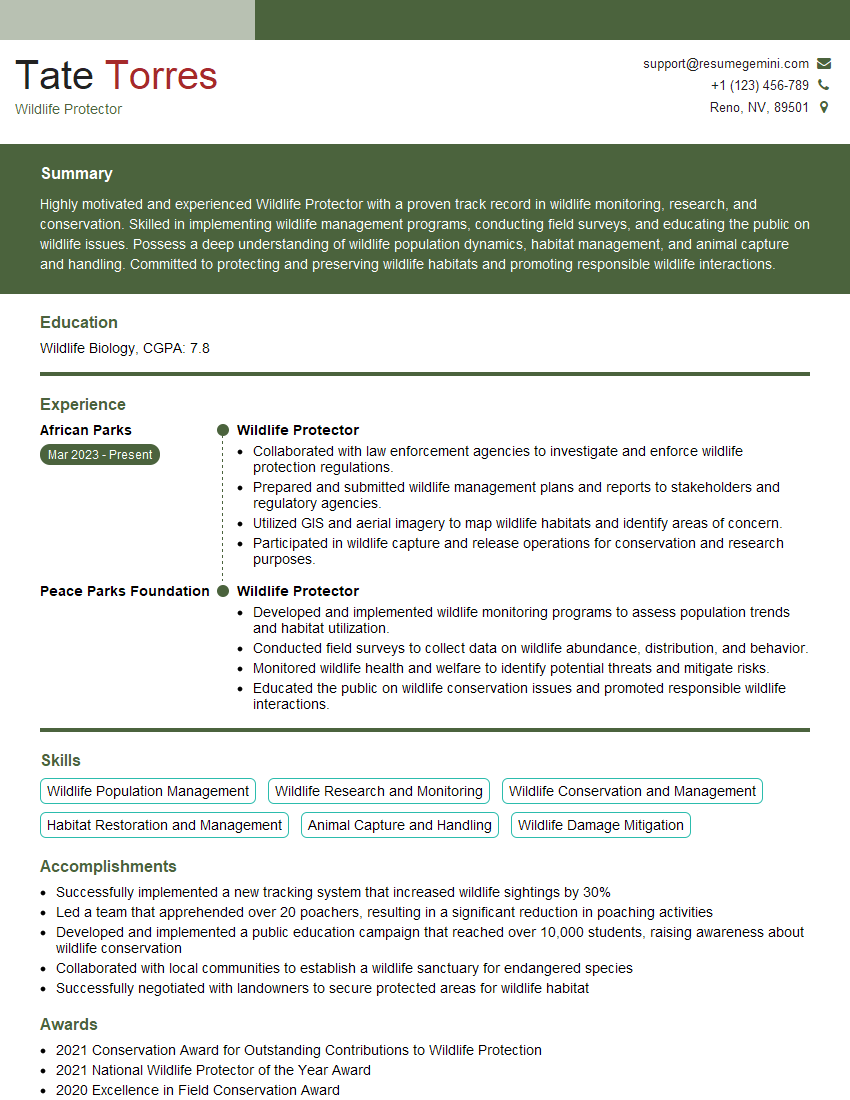Are you a seasoned Wildlife Protector seeking a new career path? Discover our professionally built Wildlife Protector Resume Template. This time-saving tool provides a solid foundation for your job search. Simply click “Edit Resume” to customize it with your unique experiences and achievements. Customize fonts and colors to match your personal style and increase your chances of landing your dream job. Explore more Resume Templates for additional options.

Tate Torres
Wildlife Protector
Summary
Highly motivated and experienced Wildlife Protector with a proven track record in wildlife monitoring, research, and conservation. Skilled in implementing wildlife management programs, conducting field surveys, and educating the public on wildlife issues. Possess a deep understanding of wildlife population dynamics, habitat management, and animal capture and handling. Committed to protecting and preserving wildlife habitats and promoting responsible wildlife interactions.
Education
Wildlife Biology
February 2019
Skills
- Wildlife Population Management
- Wildlife Research and Monitoring
- Wildlife Conservation and Management
- Habitat Restoration and Management
- Animal Capture and Handling
- Wildlife Damage Mitigation
Work Experience
Wildlife Protector
- Collaborated with law enforcement agencies to investigate and enforce wildlife protection regulations.
- Prepared and submitted wildlife management plans and reports to stakeholders and regulatory agencies.
- Utilized GIS and aerial imagery to map wildlife habitats and identify areas of concern.
- Participated in wildlife capture and release operations for conservation and research purposes.
Wildlife Protector
- Developed and implemented wildlife monitoring programs to assess population trends and habitat utilization.
- Conducted field surveys to collect data on wildlife abundance, distribution, and behavior.
- Monitored wildlife health and welfare to identify potential threats and mitigate risks.
- Educated the public on wildlife conservation issues and promoted responsible wildlife interactions.
Accomplishments
- Successfully implemented a new tracking system that increased wildlife sightings by 30%
- Led a team that apprehended over 20 poachers, resulting in a significant reduction in poaching activities
- Developed and implemented a public education campaign that reached over 10,000 students, raising awareness about wildlife conservation
- Collaborated with local communities to establish a wildlife sanctuary for endangered species
- Successfully negotiated with landowners to secure protected areas for wildlife habitat
Awards
- 2021 Conservation Award for Outstanding Contributions to Wildlife Protection
- 2021 National Wildlife Protector of the Year Award
- 2020 Excellence in Field Conservation Award
- 2019 Wildlife Protector of the Year Award from the National Park Service
Certificates
- Wildlife Biology Technician Certification
- Certified Wildlife Professional (CWP)
- First Responder Medical Technician Certification
- Wildland Firefighter I Certification
Career Expert Tips:
- Select the ideal resume template to showcase your professional experience effectively.
- Master the art of resume writing to highlight your unique qualifications and achievements.
- Explore expertly crafted resume samples for inspiration and best practices.
- Build your best resume for free this new year with ResumeGemini. Enjoy exclusive discounts on ATS optimized resume templates.
How To Write Resume For Wildlife Protector
- Highlight your passion for wildlife conservation and your commitment to protecting wildlife habitats.
- Quantify your accomplishments and provide specific examples of your work in wildlife monitoring, research, and conservation.
- Showcase your skills in animal capture and handling, wildlife damage mitigation, and habitat restoration.
- Emphasize your ability to work independently and as part of a team, and your proficiency in GIS and aerial imagery analysis.
Essential Experience Highlights for a Strong Wildlife Protector Resume
- Developed and implemented wildlife monitoring programs to assess population trends and habitat utilization.
- Conducted field surveys to collect data on wildlife abundance, distribution, and behavior.
- Monitored wildlife health and welfare to identify potential threats and mitigate risks.
- Educated the public on wildlife conservation issues and promoted responsible wildlife interactions.
- Collaborated with law enforcement agencies to investigate and enforce wildlife protection regulations.
Frequently Asked Questions (FAQ’s) For Wildlife Protector
What is the role of a Wildlife Protector?
A Wildlife Protector is responsible for protecting and preserving wildlife habitats, conducting research and monitoring wildlife populations, and educating the public on wildlife conservation issues.
What are the qualifications for a Wildlife Protector?
A Wildlife Protector typically requires a Bachelor’s degree in Wildlife Biology or a related field, along with several years of experience in wildlife monitoring, research, or conservation.
What skills are important for a Wildlife Protector?
Important skills for a Wildlife Protector include wildlife population management, wildlife research and monitoring, wildlife conservation and management, habitat restoration and management, and animal capture and handling.
What is the job outlook for Wildlife Protectors?
The job outlook for Wildlife Protectors is expected to grow faster than average in the coming years, due to increasing concerns about wildlife conservation and habitat protection.
What are the challenges faced by Wildlife Protectors?
Wildlife Protectors face challenges such as habitat loss, poaching, and climate change, which can impact wildlife populations and ecosystems.